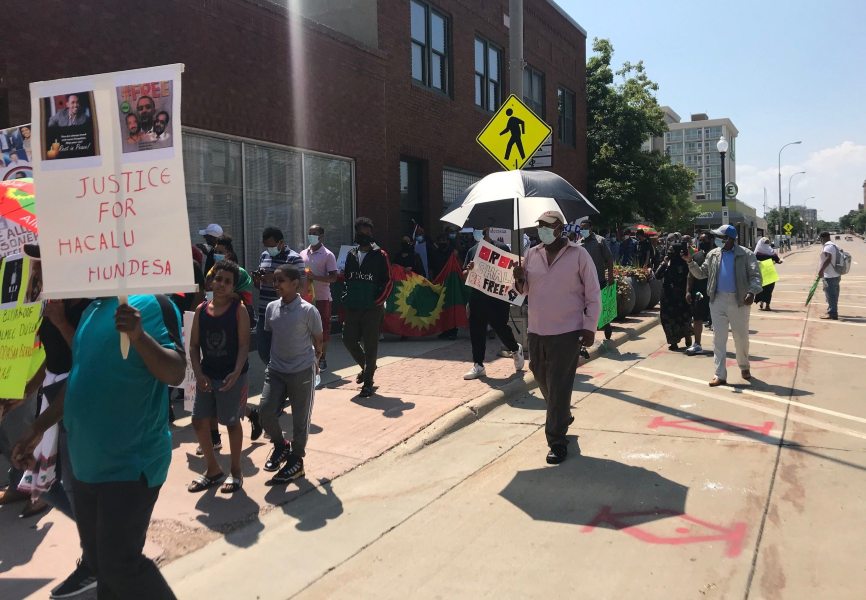The 29 June murder of activist, singer, and political icon Hachalu Hundessa has ignited violence across Addis Ababa and other Ethiopian cities. This is the latest chapter in this country's tumultuous journey from authoritarian rule toward genuine democracy. Reports of vandalism, arson, robbery, and murder have made national headlines. Some 1,200 people have been arrested. In the city of Ambo, police have shot and killed at least nine people, some of them mourners at Hundessa's funeral.
Ethiopia, Africa's second most populous nation, is no stranger to unrest. The country's constitution divides Ethiopia into ethnically based territories, but many disputes over boundaries have never been resolved. Oromo, the largest of Ethiopia's many ethnic groups, make up about one-third of the country's 112 million people, but they say they've been excluded from holding national power.
In 2014, in the Oromo-dominated city of Ambo, university students began demonstrations against a plan to expand Addis Ababa, the nation's capital, into the surrounding countryside and onto land that is part of the Oromo homeland. Confrontations between protesters turned deadly, triggering demonstrations across the country against its autocratic government. For Oromos, Hundessa's music provided the protest soundtrack. The expansion plans were scrapped, but only after hundreds were killed and thousands arrested.
Outsiders were startled by the violence, because Ethiopia was considered an economic success story. In the decade before the authoritarian government finally gave up power in 2018, Ethiopia's economy grew at 9.9% per year, and building projects produced some of sub-Saharan Africa's best roads, bridges, and electricity grids. But the spoils weren't shared equally. Ethiopia is still a poor country. Unemployment among young people remains high. The protests finally forced Prime Minister Hailemariam Desalegn to step down.
Enter Abiy Ahmed, who was sworn in as prime minister in April 2018. Abiy committed himself to national reconciliation and political openness. He lifted the state of emergency, welcomed greater press freedom, released political prisoners, and invited dissidents to return from exile. He ended 20 years of war with neighboring Eritrea. For all this, Abiy was awarded the 2019 Nobel Peace Prize.
Then his job got harder. Abiy, an Oromo, has offered a vision of Ethiopian national identity that transcends ethnic divisions. Observers say some Oromos have been emboldened by Abiy's rise and have attacked other groups in revenge. Freeing political prisoners and welcoming dissent meant opening a Pandora's box of tribal grievance. When violence escalated after Hundessa's murder, Abiy shut down the Internet.
Without obvious suspects or clear motives for the killing, Abiy has hinted that Hundessa may have been murdered by Egyptian security agents acting on orders from Cairo to stir up trouble. Egypt and Ethiopia are locked in a dispute over construction of the controversial Grand Ethiopian Renaissance Dam, an Ethiopian project which Egyptians say will divert water from the Nile. Calls for war have echoed across Egyptian media and Twitter, though negotiations continue. But Prime Minister Abiy may just be looking for a scapegoat that can unite Ethiopians against a perceived common enemy. Unfortunately, the anger and fear in Ethiopia's largest cities now has few outlets. The Internet remains down, and Abiy has postponed a national election scheduled for August for one year in response to Covid-19. The streets are the only place where the Ethiopian people can air a growing list of grievances.
This article originally appeared in the 20 July 2020 issue of TIME. Learn more:

 Demonstrators protest against the murder of Ethiopian activist, singer, and political icon Hachalu Hundessa in Sioux Falls, SD. REUTERS.
Demonstrators protest against the murder of Ethiopian activist, singer, and political icon Hachalu Hundessa in Sioux Falls, SD. REUTERS.